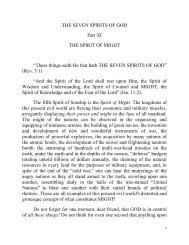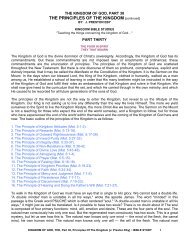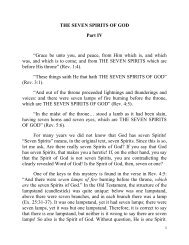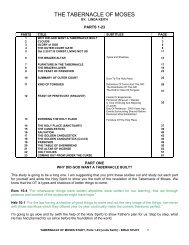Song of the Bride, Parts 1-34 - Feasting at the King's Table
Song of the Bride, Parts 1-34 - Feasting at the King's Table
Song of the Bride, Parts 1-34 - Feasting at the King's Table
You also want an ePaper? Increase the reach of your titles
YUMPU automatically turns print PDFs into web optimized ePapers that Google loves.
It is not only a flock <strong>of</strong> sheep, but a flock <strong>of</strong> “ewes” which is a symbol <strong>of</strong> fruitfulness. None is bereaved (loses<br />
no <strong>of</strong>fspring), all are twin-bearing, and in this way <strong>the</strong> flock is increasing continually. As <strong>the</strong> ewes become<br />
stronger and bring forth twins, so each virgin in <strong>the</strong> bride <strong>of</strong> <strong>the</strong> Lamb is made stronger and more beautiful by<br />
<strong>the</strong> teeth <strong>of</strong> faith, which God has provided for her. There is not only abundant fruit in her own life, as she uses<br />
her faith and feeds upon <strong>the</strong> bread from heaven, but through her faith she is in travail for o<strong>the</strong>r souls which are<br />
born into <strong>the</strong> Kingdom <strong>of</strong> heaven through her ministry and prayers <strong>of</strong> faith.<br />
PART TWENTY<br />
Newsletter No. 194 – June/July 2003<br />
<strong>Song</strong> <strong>of</strong> Solomon 4:3, “Thy lips are like a thread <strong>of</strong> scarlet, and thy mouth is comely.”<br />
Lips signify expression. As our teeth receive and mastic<strong>at</strong>e food given by <strong>the</strong> Lord, so <strong>the</strong> lips express wh<strong>at</strong><br />
has been received from Him. The Lord not only notes our spiritual perceptions, our dedic<strong>at</strong>ion, and our food,<br />
but also our expression.<br />
The bride’s lips are described as a thread <strong>of</strong> scarlet, a symbol <strong>of</strong> <strong>the</strong> Blood, which must ever be over <strong>the</strong> door<br />
<strong>of</strong> our lives and upon <strong>the</strong> door <strong>of</strong> our lips, so th<strong>at</strong> not a word shall come forth th<strong>at</strong> is not acceptable unto God.<br />
“Let your speech be always with grace, seasoned with salt, th<strong>at</strong> ye may know how ye ought to answer each<br />
one.” We should take heed to our words, in th<strong>at</strong> God has provided a white fence to hold in <strong>the</strong> tongue and<br />
doors to keep closed and locked. “Set a w<strong>at</strong>ch, O God, before my mouth, and keep <strong>the</strong> door <strong>of</strong> my lips.” Psalm<br />
141:3.<br />
Leprosy is always <strong>the</strong> symbol <strong>of</strong> sin. With <strong>the</strong> leper, <strong>the</strong>re is no fe<strong>at</strong>ure th<strong>at</strong> is so disfigured as <strong>the</strong> lips, which<br />
become thick, white and scurfy. At all times must <strong>the</strong> leper keep his mouth covered, and as soon as he hears<br />
footsteps he must cry “Unclean!” When corrupt (rotten, worthless) or idle words come forth, if we had spiritual<br />
vision we would see upon each o<strong>the</strong>r’s lips <strong>the</strong> sign <strong>of</strong> leprosy. “The heart <strong>of</strong> <strong>the</strong> righteous studieth to answer.”<br />
If our hearts prayerfully studied to see whe<strong>the</strong>r every answer was from God or from ourselves, whe<strong>the</strong>r it could<br />
come through our lips and nei<strong>the</strong>r mar <strong>the</strong>ir scarlet beauty, nor leave a trace <strong>of</strong> leprosy behind, how many<br />
words would be cut <strong>of</strong>f, and changed.<br />
In James, we are told to be “quick to hear, slow to speak, and slow to wr<strong>at</strong>h.” But many are quick to speak and<br />
teach o<strong>the</strong>rs; quick to strive and defend <strong>the</strong>mselves, even when <strong>the</strong>y are in <strong>the</strong> wrong; quick to wr<strong>at</strong>h or<br />
irritability. They are slow only when it comes to being taught and hearing instruction. Prov. 1:7 says, “By thy<br />
words thou shalt be justified and by thy words thou shalt be condemned.” We must take heed th<strong>at</strong> <strong>the</strong> words <strong>of</strong><br />
our mouths and <strong>the</strong> medit<strong>at</strong>ions <strong>of</strong> our hearts are acceptable in <strong>the</strong> sight <strong>of</strong> our Beloved, and do not bring<br />
reproach upon His Name.<br />
“A thread <strong>of</strong> scarlet” has two aspects <strong>of</strong> truth. The first indic<strong>at</strong>es redemption, as when Rahab bound <strong>the</strong> scarlet<br />
thread in her window (Joshua 2:21). The o<strong>the</strong>r aspect is th<strong>at</strong> <strong>of</strong> authority, as in M<strong>at</strong>. 27:28-29, “And <strong>the</strong>y<br />
stripped him, and put on him a scarlet robe. And when <strong>the</strong>y had pl<strong>at</strong>ted a crown <strong>of</strong> thorns, <strong>the</strong>y put it upon his<br />
head, and a reed in his right hand: and <strong>the</strong>y bowed <strong>the</strong> knee before him, and mocked him, saying Hail, King <strong>of</strong><br />
<strong>the</strong> Jews.”<br />
In <strong>the</strong> verbal expression <strong>of</strong> <strong>the</strong> spouse <strong>the</strong>re is evidence th<strong>at</strong> her life has been cleansed (in redemption), and<br />
th<strong>at</strong> her lips are under <strong>the</strong> authority <strong>of</strong> <strong>the</strong> King. How different is <strong>the</strong> speech from <strong>the</strong> lips <strong>of</strong> those who reject<br />
His authority and say, “With our tongue will we prevail: our lips are our own: who is lord over us? Psalm 12:4.<br />
Our lips need to experience <strong>the</strong> process <strong>of</strong> redemption by submission to <strong>the</strong> authority <strong>of</strong> <strong>the</strong> Lord. They must<br />
express <strong>the</strong> purity and virtue <strong>of</strong> <strong>the</strong> life <strong>of</strong> Christ.<br />
I’m sure we all have experienced speaking forth words th<strong>at</strong> origin<strong>at</strong>ed from <strong>the</strong> Spirit. At times we’d ask<br />
ourselves, “Now, why did I say th<strong>at</strong>?” The past while I have been in touch with a young man here who<br />
sometimes helps me with my computer. At <strong>the</strong> conclusion <strong>of</strong> our visits, I find myself saying, “You’re going to be<br />
a success in life. I just know it!” (Even though I knew he had dropped out <strong>of</strong> school before finishing Grade 12).<br />
SONG OF THE BRIDE, <strong>Parts</strong> 1–<strong>34</strong> [Elaine Cook] ~ BIBLE STUDY 30


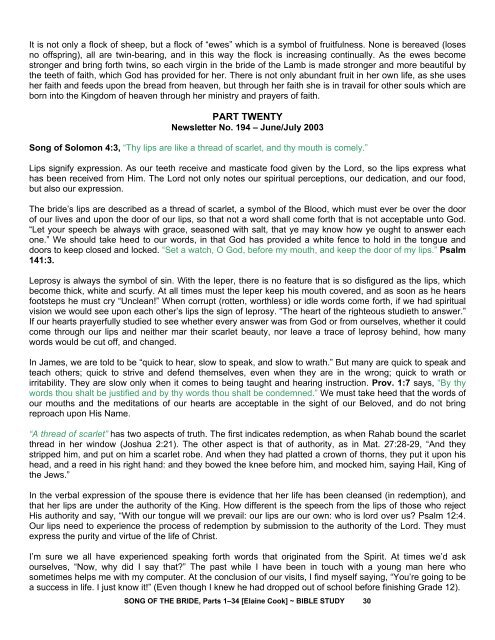
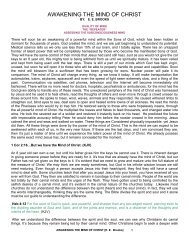
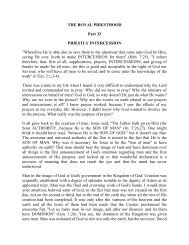
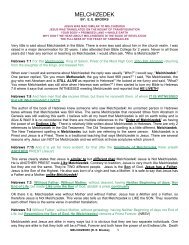
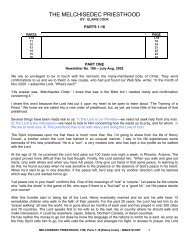
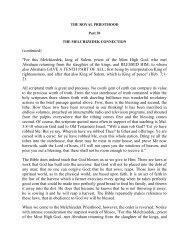
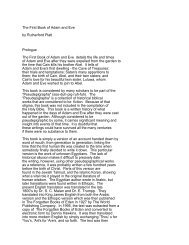
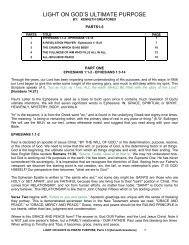
![WOOD AND STONE â THE STORY OF KING CAIN [EE Brooks]](https://img.yumpu.com/31019666/1/190x245/wood-and-stone-a-the-story-of-king-cain-ee-brooks.jpg?quality=85)
